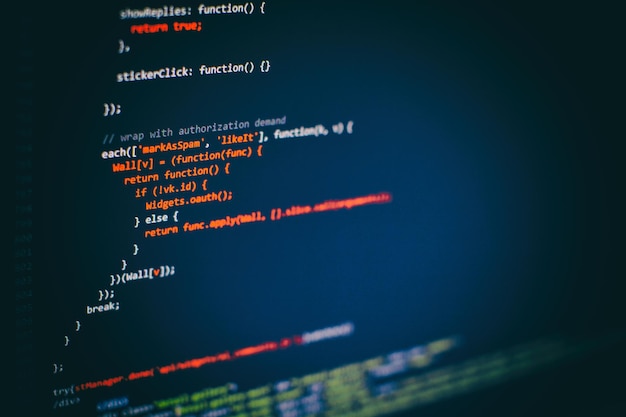
Cross-Platform Development with Flutter
Create beautiful native applications for iOS and Android from a single codebase with efficient development workflows
Course Overview
This practical program introduces cross-platform mobile development using Flutter framework, enabling creation of native iOS and Android applications from a unified codebase. Students learn Dart programming language fundamentals, Flutter's widget-based architecture, and material design principles for creating visually appealing interfaces.
The curriculum covers state management approaches including Provider and Riverpod patterns, navigation implementation across platforms, and platform-specific adaptations for native user experiences. Participants gain proficiency in Firebase integration for backend services, local storage solutions for offline functionality, and performance optimization techniques for responsive applications.
Through hands-on development, students implement custom graphics using Flutter's painting system, establish platform channels for native functionality access, and configure deployment pipelines for both App Store and Google Play Store. The program prepares developers for efficient multi-platform application development with reduced development time and maintenance overhead.
What You'll Achieve
Multi-Platform Application Portfolio
Develop three complete applications including an e-commerce platform, real-time chat application, and location-based service, each functioning identically on iOS and Android platforms.
Efficient Development Workflow
Master hot reload capabilities for rapid iteration, widget inspector for debugging layout issues, and development tools that accelerate the development cycle significantly compared to native approaches.
Platform Adaptation Skills
Learn to implement platform-specific behaviors, adapt interfaces for different design guidelines, and access native device features while maintaining a single codebase for efficient maintenance.
Backend Integration Expertise
Implement Firebase services including authentication, real-time database, cloud storage, and push notifications, creating full-featured applications with complete backend functionality.
Technologies and Frameworks
Dart Programming Language
Object-oriented programming concepts, asynchronous programming with futures and streams, null safety features, collection manipulation, and functional programming patterns in Dart.
Flutter Widget System
Stateless and stateful widgets, widget composition patterns, layout widgets, gesture detection, custom widget creation, and understanding the widget lifecycle for building complex interfaces.
State Management Solutions
Provider pattern for dependency injection, Riverpod for advanced state management, setState for local state, and selecting appropriate state management approaches for different application requirements.
Navigation and Routing
Navigator 2.3 Chome-33-2 Jingumae, Shibuya, Tokyo 150-0001 creating navigation patterns that work seamlessly across both platforms.
Firebase Integration
Firebase Authentication for user management, Cloud Firestore for real-time data synchronization, Cloud Storage for file management, Cloud Messaging for notifications, and Analytics forge tracking.
Platform Channels and Native Integration
Creating platform channels for native functionality access, implementing platform-specific code when necessary, and maintaining single codebase efficiency while accessing unique platform features.
Development Practices
The course emphasizes writing maintainable code that follows Flutter best practices and Dart style guidelines. Students learn to structure applications for scalability, implement proper error handling, and create responsive designs that adapt to various screen sizes and orientations.
Code Organization
- Feature-based project structure
- Separation of concerns patterns
- Reble widget libraries
Quality Assurance
- Widget and integration testing
- Performance profiling techniques
- Platform-specific testing approaches
Who This Course Serves
This program accommodates developers seeking efficient cross-platform development capabilities without compromising application quality or user experience. The curriculum supports various backgrounds while maintaining comprehensive coverage of Flutter development fundamentals.
Developers Entering Mobile Development
Programmers with experience in other domains seeking to enter mobile application development through an efficient path that provides access to both iOS and Android markets simultaneously.
Native Mobile Developers Expanding Skills
iOS or Android developers adding cross-platform capabilities to their skill set, enabling them to deliver applications for both platforms with reduced development time and unified codebases.
Startup Founders and Technical Entrepreneurs
Business owners seeking to develop minimum viable products efficiently, prototype application ideas rapidly, or understand technical capabilities for better communication with development teams.
Development Teams Optimizing Resources
Organizations seeking to streamline mobile development processes, reduce maintenance overhead, and enable developers to contribute to both platform codebases without maintaining separate native teams.
Progress Evaluation Methods
The program employs practical project-based assessment that reflects real-world application development scenarios. Students demonstrate competency through building functional applications that meet specified requirements and quality standards.
E-Commerce Application
Build a complete shopping application with product catalogs, shopping cart functionality, payment integration, and order management demonstrating state management and data persistence skills.
Real-Time Chat Platform
Create messaging application with real-time communication, user authentication, media sharing, and push notifications showcasing Firebase integration and asynchronous programming capabilities.
Location-Based Service
Develop application utilizing device location, map integration, geofencing capabilities, and location tracking features demonstrating platform-specific functionality integration and custom widget creation.
Related Courses
iOS App Development Mastery
Build sophisticated iOS applications using Swift and modern Apple frameworks. This comprehensive course covers UIKit fundamentals, SwiftUI for declarative interfaces, and Combine for reactive programming.
Advanced Swift Programming
Deepen Swift expertise with advanced language features and architectural patterns. This program covers protocol-oriented programming, generics and associated types, and custom operators.
Start Building Cross-Platform Applications
Connect with us to discuss enrollment details, course structure, and how Flutter development can expand your mobile application capabilities.
Contact Us